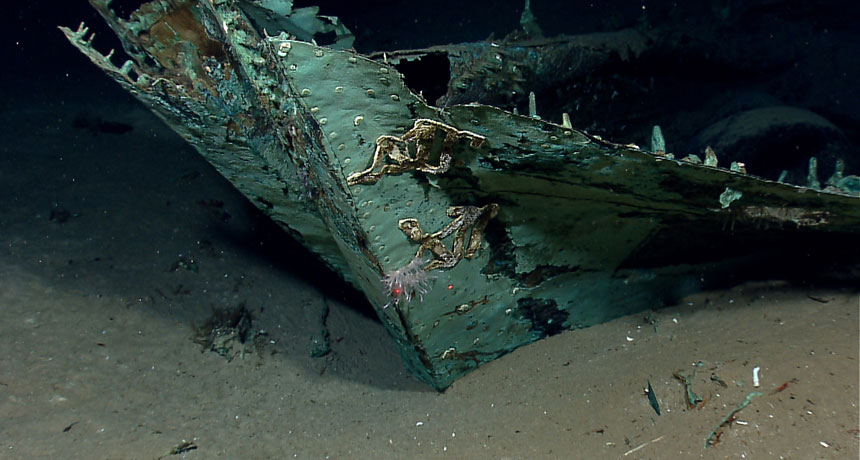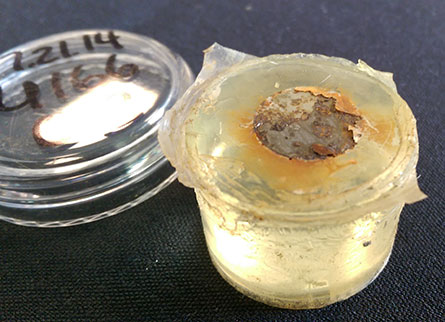Gulf oil spills could destroy shipwrecks faster
Metal breaks down more slowly in clean water, study finds

A 19th-century shipwreck in the Gulf of Mexico. The metal in these historical wrecks is in danger of being destroyed by oil spills.
Image courtesy NOAA Okeanos Explorer Program
NEW ORLEANS, La. — In April 2010, an explosion at the Deepwater Horizon drilling platform caused a huge oil spill in the Gulf of Mexico. Leftover oil from that spill still pollutes the Gulf. And that oil could be speeding up the destruction of old shipwrecks there, data now suggest.
Corrosion is a type of chemical reaction that can weaken — and ultimately destroy — metal structures. Researchers studied aquatic microbes that can foster this corrosion. Oil mixed into seawater roughly doubled the rate of the microbe-driven corrosion. The scientists shared their findings, here, on February 22 at the American Geophysical Union’s Ocean Sciences Meeting.

Jennifer Salerno is a marine ecologist at George Mason University in Fairfax, Va. She and her colleagues placed thin steel disks near sunken ships for four months. They also put the disks in special water tanks for 16 weeks. Steel decayed much more in the oily water than it did in the clean seawater. These disks also became home to different types of microbes, the researchers found.
Salerno thinks the oil may change the ocean ecosystem by making it a better home for metal-chomping microbes. Or oil might trap corrosive chemicals, released by the microbes, close to the metal. Either way, it’s bad news for the Gulf’s sunken ships.
Power Words
(for more about Power Words, click here)
aquatic An adjective that refers to water.
corrosion (v. to corrode) A process whereby metals react with gases or other materials in their environment and undergo a type of degradation. The rusting of iron, for instance, is one example of corrosion, driven by exposure to moisture.
ecology A branch of biology that deals with the relations of organisms to one another and to their physical surroundings. A scientist who works in this field is called an ecologist.
ecosystem A group of interacting living organisms — including microorganisms, plants and animals — and their physical environment within a particular climate. Examples include tropical reefs, rainforests, alpine meadows and polar tundra.
geophysics (adj. geophysical) The branch of science that deals with the physical properties of the Earth. It uses the principles and laws of physics to interpret the internal internal structure, magnetic and gravitational fields, climate, atmosphere, oceans, sea ice and land forms. People who work in this field are known as geophysicists. They study Earth’s features by measuring seismic (acoustic), gravitational, electrical and magnetic properties.
marine Having to do with the ocean world or environment.
microbe Short for microorganism. A living thing that is too small to see with the unaided eye, including bacteria, some fungi and many other organisms such as amoebas. Most consist of a single cell.
sea An ocean (or region that is part of an ocean). Unlike lakes and streams, seawater — or ocean water — is salty.
U-boat The abbreviation for a German submarine. The term is short for unterseeboot, meaning undersea boat.







